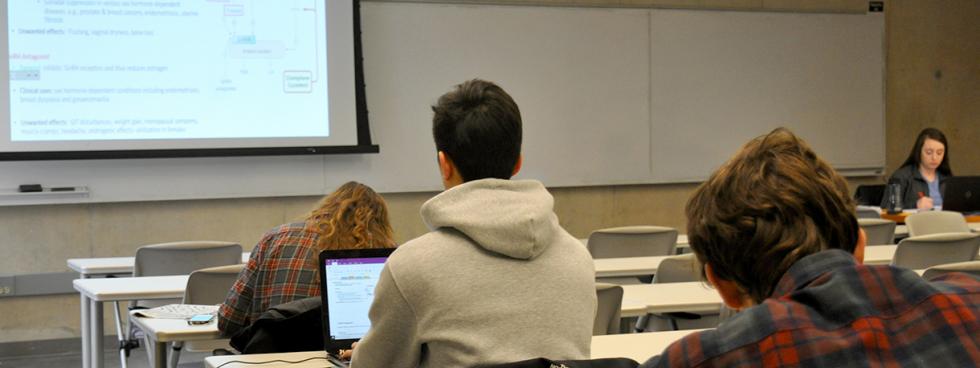
Taking the Course to the Students
It’s only a couple of miles from the College of Veterinary Medicine to the main Iowa State University campus.
But for many Iowa State undergraduates that short distance proves to be insurmountable when it comes time to attend classes on the vet med campus.
Such was the case for the Principles of Pharmacology courses taught by the Department of Biomedical Sciences. The four-credit hour course is offered four days a week during the spring semester and has become a popular course for undergraduates to take.
That’s because a new pharmacology/toxicology undergraduate minor has been recently approved. The minor has attracted several Iowa State seniors who plan to pursue some sort of medical school after graduating. Many also enroll in the master’s biomedical sciences program in the Department of Biomedical Sciences following graduation.
“The first year we offered this course we held it on the vet med campus,” said Dr. Richard Martin, the Dr. E.A. Benbrook Endowed Chair in Pathology and Parasitology and a Distinguished Professor in the Department of Biomedical Sciences. “The undergraduate students found it difficult to come to the vet college because of their other classes taken on campus and the limited time lines for class schedules.”
The Department of Biomedical Sciences decided the answer to the problem was to provide a video link to the main campus. This semester around 15 students are “attending” the class in Coover Hall including Iowa State entomology graduate student Jacob Johnson.
"I have a required statistics course that finishes 10 minutes before pharmacology and I would not have been able to take this course if the campus location wasn't offered," he said.
Additional students are attending the “live” course in the College of Veterinary Medicine where the instructor gives that day’s lecture.
“When we have offered online instruction in the past, we know that success is limited if it is not supported by human instructors who appear in front of the students on occasions,” said Martin, the course’s instructor-in-charge and one of the five Department of Biomedical Sciences professors teaching the course.
In addition, a graduate of the master’s program serves as the teaching assistant and attends each class on campus while providing study reviews for each test.
“I act as the liaison between the main campus students and the instructor in vet med,” said Sam Thomson, this year’s teaching assistant. “During the class I also help the students take a daily quiz and assist them to ask any questions during the lecture.”
The off-site students hear the lecture just like the students sitting in the classroom with the instructor. The students are encouraged to use microphones to ask questions and a live stream video of the professor is transmitting on the in-room projector screen. The lectures are also recorded and students can re-watch them on their own time.
Martin says the instructors visit students in the main campus classroom during tests and have discussed approaches to improve interactions with them.
For the undergraduate students, the convenience of staying on main campus has several benefits.
“It has allowed me to make better use of the time I have between classes,” said Clair Birchmier, a senior in nutritional science. “I am able to fit in a couple of hours of studying between classes that I wouldn’t have been able to do if I had to go out to the vet college.”
Birchmier says she prepares for this class no differently than she does the others on her schedule. This is the first remotely transmitted class she has taken and so far, it has met her expectations.
“This class has been better than online classes because you still regularly attend class, participate in asking questions and take in-class quizzes,” she said. “Engaging in these types of class activities has greatly enhanced my learning.”
"All of the instructors and teaching assistants are quick to respond to questions by email," Johnson said. "The on-campus availability far outweighs the minor issues we have."
April 2019
